

The death toll has exceeded 40,000 since the Israel-Hamas conflict broke out on Oct 7, 2023.

RAMALLAH -- US Secretary of State Antony Blinken has rejected Palestinian President Mahmoud Abbas's request for a cease-fire in the Gaza Strip, according to a Palestinian official.
The official told Xinhua that Blinken reaffirmed during his meeting with Abbas in the West Bank city of Ramallah "Israel's right to defend itself and continue its military campaign" in Gaza.
Blinken's visit to Ramallah lasted for about an hour, during which he met with Abbas and his senior aides to discuss the ongoing Israel-Hamas conflict, said the official who wished to remain anonymous.
He said Blinken had promised to pressure Israel to avoid harming civilians and provide safe corridors for humanitarian relief, but refused to discuss cease-fire mechanisms at this stage.
The official added that Abbas and Blinken agreed to adhere to the two-state solution and work on it after the end of the conflict in Gaza.
The Israel-Hamas conflict, raging for nearly a month, has killed at least 9,488 Palestinians in Gaza. On the Israeli side, more than 1,400 people lost their lives, the vast majority in the Hamas military attacks on Israel on Oct 7, which triggered the ongoing conflict.

GAZA - The Palestinian Islamic Resistance Movement (Hamas) will ban foreign passport holders from leaving the Gaza Strip if injured Palestinians from the northern part of the enclave are not allowed to reach Egyptian hospitals for treatment via the Rafah border crossing, a Palestinian security source said on Saturday.
"All concerned parties must intervene to coordinate the exit of the wounded from Gaza hospitals towards the Rafah crossing for treatment in Egyptian hospitals," the security source, who wished to remain anonymous, told Xinhua.
Without such a measure being taken, Hamas said no foreign passport holders would be allowed to leave the Gaza Strip, the source added.
The Hamas announcement came amid media reports saying that the Gaza-ruling Palestinian group was trying to send wounded fighters out of Gaza through the Rafah border crossing. The New York Times quoted anonymous US government official as saying on Friday that Hamas had provided to Israel, the United States and Egypt with a list of Palestinians who were injured and should be allowed to enter Egypt, and the list included the names of Hamas fighters.
The announcement followed Israeli airstrikes on an ambulance convoy on Friday.
The Hamas-run health ministry said the ambulances carrying patients were on their way to the Rafah border crossing to exit Gaza for treatment.
Ambulances carrying 30 wounded people were targeted in three locations, one of which was near the gate of al-Shifa hospital, according to Mohammed Abu Silmeia, the director of the Hospital.
He added that other Israeli attacks on ambulances took place in the Ansar area and places near Al-Rashid Street, west of Gaza City.
At least 13 Palestinians were killed in the airstrikes, he said.

GAZA -- Palestinian sources said that Israeli tanks advanced on the southern outskirts of Gaza City on Thursday amid intense gunfire, preceded by violent air strikes.
The sources told Xinhua that "some Israeli tanks are advancing in an attempt to cut off the Rashid road to separate northern Gaza from the south."
The Rashid coastal road is one of the main roads leading to southern Gaza.
Meanwhile, Israeli Prime Minister Benjamin Netanyahu said on his X account, "We have very impressive successes, we are already more than the outskirts of Gaza City. We are making progress... We will move forward."
Local eyewitnesses told Xinhua that the Israeli tanks arrived at the outskirts of Al Nour, south of the city, while other tanks advanced near Street 10.
The eyewitnesses said that fighters from the Al-Qassam Brigades, the armed wing of Hamas, launched attacks on the invading forces with anti-tank missiles to prevent them from advancing, and the clashes are still continuing.
Meanwhile, medical sources confirmed that communications with the Turkish Hospital in the south of Gaza City were completely cut off.
Also on Thursday, Israeli aircraft raided the vicinity of Al-Quds Hospital in the Tal al-Hawa neighborhood south of Gaza City, said the Palestine Red Crescent Society (PRCS).
"There are a number of deaths as well as wounded people in the territory," the PRCS said.

China assumed on Wednesday the rotating presidency of the United Nations Security Council for November with a focus on the Palestine-Israel conflict.
The Palestine-Israel situation tops the Security Council's agenda this month, said Zhang Jun, China's permanent representative to the UN.
"It is imperative to push for a cease-fire and halt the fighting, prevent further civilian casualties, prevent a larger-scale humanitarian disaster and prevent the conflict from spilling over," he told reporters at a news briefing on the work of China's presidency.
The presidency of the Security Council rotates among its 15 members monthly. China last held the rotating presidency in August 2022.
The presidency for November comes amid the criticism the Security Council is facing for its perceived slow response to the ongoing Palestine-Israel conflict.
As of Thursday, the number of Palestinian casualties in the Gaza Strip had passed 9,000, according to the Hamas-run Health Ministry in Gaza. More than 1,400 people in Israel have lost their lives so far, most of them killed in the Oct 7 Hamas attack, Israeli authorities said.
"As the rotating president of the Security Council, China will respond to the calls of the international community and work with all parties concerned to promote responsible and meaningful collective action by the council in a timely manner," Zhang said.
He emphasized that based on the current situation and tasks facing the Security Council and the expectations of all parties, China will "push the Security Council to take action, fulfill its responsibilities under the UN Charter, demonstrate its commitment, promote the easing of tensions and support diplomatic efforts".
"We will urge the Security Council to focus on the root causes, look at the complex problem of the intertwining of the development deficit and the security deficit, and explore ways to solve it from a broader perspective," Zhang said.
"We will also push the Security Council to improve its working methods, strengthen unity and cooperation, enhance its authority and efficiency, and respond more effectively to the current complex situation," he added.
The Security Council will also consider issues related to Syria, Yemen and Bosnia-Herzegovina this month, according to Zhang. It will take action on the UN assistance mission in Sudan, the UN mission in the Central African Republic and the extension of the authorization of sanctions on Somalia, as well as hold its annual regular dialogue with the commissioner of UN peacekeeping police, he said.
Foreign Ministry spokesman Wang Wenbin said on Thursday that China has always been a builder of world peace, a contributor to global development and a defender of the international order.
"China will firmly uphold the international system with the UN at its core, the international order underpinned by international law, and the basic norms governing international relations based on the purposes and the principles of the UN Charter," he said at a regular news conference.
Liu Jianqiao in Beijing contributed to this story.
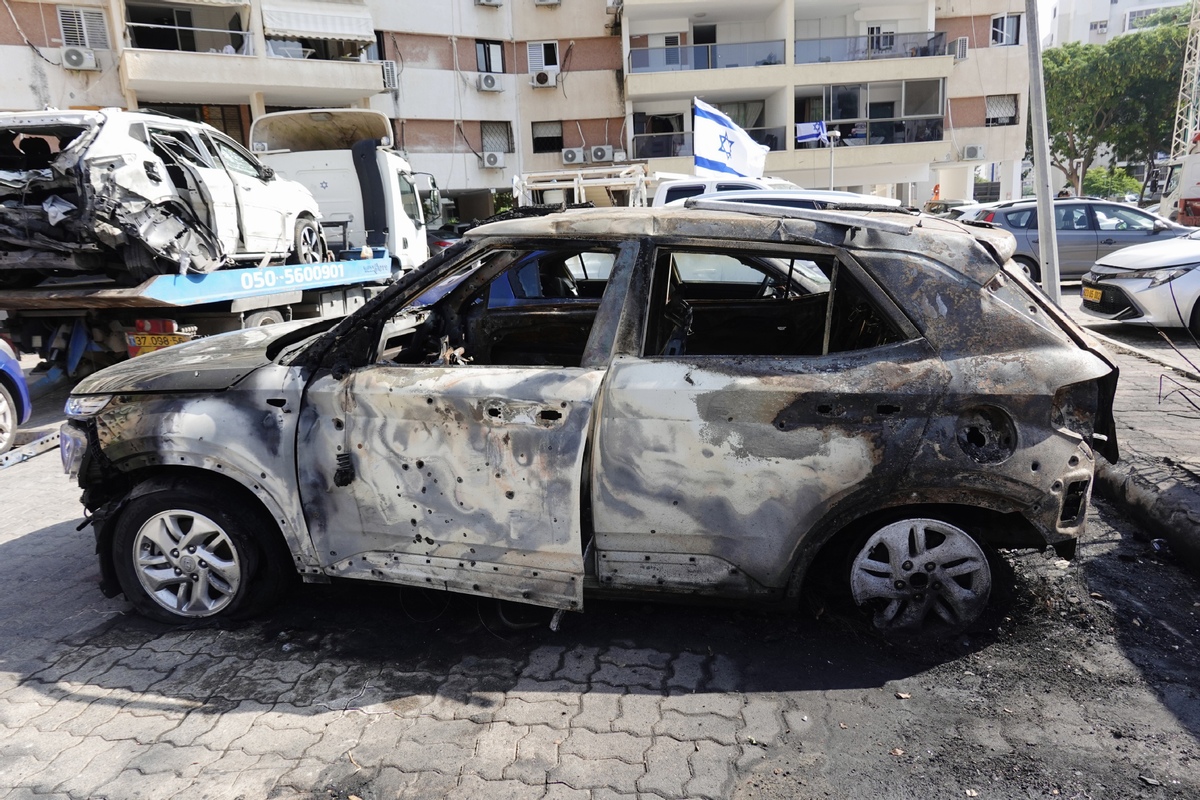
JERUSALEM/GAZA -- The death toll has exceeded 10,000 since the Israel-Hamas conflict broke out on Oct 7, according to Palestinian and Israeli sources.
The number of Palestinian casualties in Gaza has now reached at least 8,796, including 3,648 children and 2,290 women, according to the Gaza-based Health Ministry, while more than 1,400 people in Israel have been killed, said the Israeli Foreign Ministry.
On Wednesday, at least 320 foreign citizens on an initial list of 500, as well as dozens of severely injured Gazans, crossed into Egypt through the Rafah border crossing under a deal between Israel, Egypt and Hamas.
The Egyptian Health Ministry said some of the evacuees had been transferred to the Al-Arish and Bir Al-Abd hospitals in North Sinai, adding that quarantine doctors at the Rafah crossing conducted medical examinations for 117 foreign nationals, including 35 children who received necessary vaccinations.
"All cases are stable and receiving superior medical care from the medical teams at the crossing or inside the hospitals," the ministry said.
The death toll in the Gaza Strip continues to climb as hospitals and refugee shelters are hit. Nearly 70 percent of those reported killed in Gaza are children and women. Save the Children, an international non-governmental organization, reported that nearly 3,200 children have been killed in Gaza in just three weeks.
This surpasses the number of children killed annually across the world's conflict zones since 2019, Philippe Lazzarini, the commissioner-general of the United Nations (UN) Agency for Palestine Refugees, said on Monday. "This cannot be 'collateral damage,'" he noted.
On Oct 28, the UN General Assembly adopted a resolution that calls for "an immediate, durable and sustained humanitarian truce leading to a cessation of hostilities," including the protection of civilians, the protection of humanitarian personnel and facilities, and the "immediate and unconditional release" of all civilians being illegally held captive.
The resolution was adopted with 120 votes in favor, 14 votes against, and 45 abstentions. The United States and Israel voted against the draft resolution.
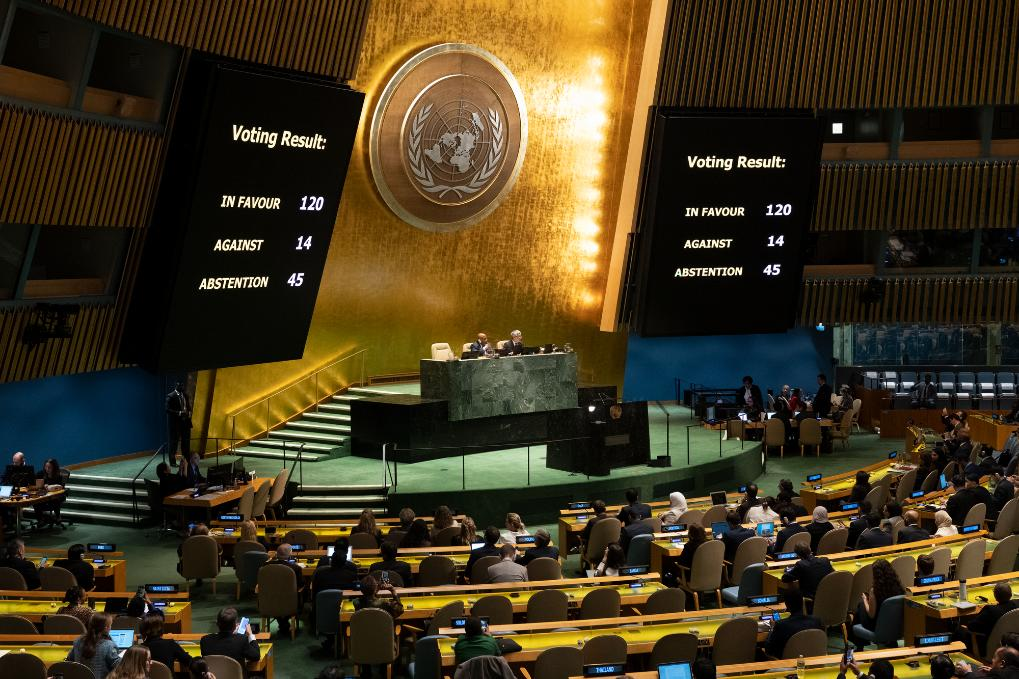
Earlier on Oct 16, the United States voted against a Russian-drafted resolution that called for a humanitarian ceasefire in Gaza, and again vetoed a Brazilian-drafted resolution that would have called for humanitarian pauses in Gaza two days later.
Despite international calls for a humanitarian ceasefire, Israel continued heavy bombings on the densely populated Gaza Strip and intensified its ground offensive, sending troops deep into Palestinian territory.
The Israel Defense Forces (IDF) said its soldiers engaged in "fierce battles" with Hamas "deep in the Gaza Strip," adding that Israeli troops attacked hundreds of military targets of Hamas, including anti-tank missile and rocket launching posts below shafts and military compounds inside underground tunnels, and killed "numerous" Hamas militants.
"We are advancing in the stages of the war and operating on the ground inside the enemy's territory," IDF Chief of the General Staff Herzi Halevi wrote in a letter sent to commanders and soldiers, vowing "it will be long, and we will fight until the end."
Israeli Defense Minister Yoav Gallant said during a visit of armored troops deployed on the Gaza border that Israel would continue coordinated strikes on Gaza from the air, ground and sea, and the military has taken actions to expose tunnels to "deal heavy blows to enemies within."
On the diplomatic front, Bolivia has severed its diplomatic ties with Israel. Meanwhile, Jordan, Chile, and Colombia have recalled their ambassadors.
JERUSALEM/GAZA -- Despite international calls for a humanitarian ceasefire, Israel continued heavy bombings on the densely populated Gaza Strip on Wednesday, killing a senior Hamas commander in an airstrike, while the first group of evacuees entered Egypt since the Israel-Hamas conflict broke out on Oct 7.
"We are advancing in the stages of the war and operating on the ground inside the enemy's territory," the Israel Defense Forces (IDF) Chief of the General Staff Herzi Halevi wrote in a letter sent to commanders and soldiers, vowing "it will be long, and we will fight until the end".
Israeli Defense Minister Yoav Gallant said during a visit of armored troops deployed on the Gaza border that Israel would continue coordinated strikes on Gaza from the air, ground and sea, and the military has taken actions to expose tunnels to "deal heavy blows to enemies within".
The Israeli military revealed in a statement that based on IDF and ISA (U.S. Intelligence Support Activity) intelligence, an IDF fighter jet struck Muhammad A'sar, head of Hamas anti-tank missile unit who had commanded "numerous missile attacks" on Israeli targets.
The military also announced that at least 15 of its soldiers were killed in the past day in three separate incidents in the northern Gaza Strip.
On Wednesday, through the Rafah border crossing, the only lifeline for people seeking to leave the conflict-ravaged enclave, the first group of some 500 holders of foreign passports and some 80 injured people entered Egypt, according to Egyptian and Palestinian sources.
Palestinian Health Minister Mai al-Kaila said the Turkish hospital was out of service under Israeli strikes and fuel shortfall. Gazan medical officials also warned that the work of the largest Shifa Medical Complex, other hospitals and health institutions would stop within hours due to the exhaustion of fuel needed to operate electrical generators.
Palestinian health officials said more than 50 people were killed following an Israeli airstrike on the Jabalia refugee camp in northern Gaza on Tuesday. Hamas said seven of its hostages, including three holding foreign passports, were killed in the Israeli bombing of the refugee camp.
The number of Palestinian casualties in Gaza has now reached at least 8,796, including 3,648 children and 2,290 women, according to the Gaza-based Health Ministry. While in the occupied West Bank, more than 132 Palestinians have been killed by Israeli troops and settlers.
More than 1,400 people in Israel have been killed, mostly civilians who were slain in the initial Hamas surprise attack on Oct. 7 that triggered the fighting, said the Israeli Foreign Ministry.
Approximately 240 hostages were kidnapped from Israel into Gaza and Hamas released four women. A female Israeli soldier has been rescued in a special operation by Israeli forces, according to IDF.
Meanwhile, photos released by the Israeli military show Saar-class corvettes patrolling in the Red Sea, as the army confirmed missile boats were dispatched to the waters after Houthi forces in Yemen fired missiles and drones toward Israel's resort city of Eilat.
In southern Lebanon, a 16-year-old Lebanese boy was killed in an Israeli drone strike, while two shepherds lost lives after being shot by Israeli forces, Lebanese military sources told Xinhua.
The death toll from Hezbollah-Israeli confrontations since Oct 8 rose to 63 on the Lebanese side, including 49 members of Hezbollah, in addition to nine members of the Islamic Resistance Movement (Hamas) and Islamic Jihad in Lebanon, and five civilians.
On the diplomatic front, Bolivia has severed its diplomatic ties with Israel, citing the Palestinian death toll in Gaza. Meanwhile, Jordan, Chile, and Colombia have recalled their ambassadors.
Iran's supreme leader on Wednesday urged Muslim governments to unite and stop oil and other exports to Israel to pressure the latter to cease its attacks on Gaza.

France, the United Kingdom, and the Netherlands are formulating plans to ship humanitarian aid to Gaza in an effort to ease Palestinian civilian hardships and relieve strain on the overburdened Egypt-Gaza border crossing.
France's President Emmanuel Macron and Netherlands' Prime Minister Mark Rutte first proposed the idea of sea-delivered aid during visits to Israel last week, with the UK also firming up its intentions in a phone call on Sunday between Macron and UK Prime Minister Rishi Sunak, sources told the Financial Times newspaper.
"The sea is, of course, a possibility," Netherlands' Defense Minister Kajsa Ollongren told the FT. "We know that the French have already sent one of their vessels for medical aid. Lots of our partner countries, and we also, are in Cyprus with our military."
Discussions are ongoing regarding the specifics of delivering aid via a sea route, and while the plan's realization is not guaranteed, diplomatic efforts continue to focus on facilitating its potential flow through the only non-Israel-controlled crossing, the Rafah crossing with Egypt, according to insiders.
Israel's blockade of Gaza following the Oct 7 Hamas attack has restricted water and power supplies and only 131 trucks carrying essential water, food, and medicine have been permitted through Rafah into Gaza, a drastic reduction from the approximately 500 that entered daily prior to the outbreak of conflict.
A senior UN official said Israel requires all aid trucks entering Gaza from Egypt to first undergo an inspection at Nitzana, in southern Israel, causing delays as supplies are unloaded for inspection, reloaded, and sent back into Egypt, only to be unloaded and reloaded once more onto Palestinian trucks at the Rafah crossing.
Macron spoke on Friday about his plan to join forces with European Union partners to create a "maritime humanitarian corridor", intending to transport injured Palestinians and distribute food and medical necessities in Gaza.
"Cyprus will serve as a rear base for this corridor … and Greece is willing to send equipment, along with any European partners who want to take part in this operation," he said. "It will take some time to work out but there have already been contacts between us and the Israeli authorities about this."
The Associated Press cited a senior Cyprus government official as saying its leader, President Nikos Christodoulides, had pitched the idea to Israel's Prime Minister Benjamin Netanyahu, who "wasn't opposed".
"We want to be ready to start sending aid once a window of opportunity opens," the official said. "Everyone recognizes the need for this corridor and that it is feasible."
Aid agencies have warned that Gaza's residents, under heavy air and artillery bombardment as Israeli forces advance to try to eradicate Hamas in the 40-kilometer-long territory, are trapped in horrific conditions, with the Hamas-run health ministry reporting more than 8,500 deaths since the start of Israel's campaign.
EU leaders last week issued a statement of "gravest concern" and called for "humanitarian corridors and pauses" in the fighting.

RAFAH, Egypt -- Egypt received on Wednesday wounded Palestinians and foreign passport holders from the besieged Gaza Strip via the Rafah crossing, the only linking point between Egypt and the enclave, a local source told Xinhua.
Some 225 foreign passport holders crossed from the Gaza Strip into Egypt, said the source who asked to remain anonymous, adding that most of them were from Jordan and were heading by bus to the Arish city, the largest city on the Sinai Peninsula, lying on the Mediterranean coast.
Meanwhile, 15 wounded Palestinians from Gaza arrived in Egypt earlier along with 12 family members, the source added.
A total of 81 wounded were supposed to enter Egypt on Wednesday as the first batch, but ten passed away before leaving Gaza.
This is the first time that the Rafah crossing has been opened for the exit of the wounded and those holding foreign passports from Gaza since the conflict started last month.
The developments coincided with the announcement by the spokesman of the Al-Qassam Brigades, the armed wing of Hamas, on Tuesday that it would release foreign hostages "in the coming days."
Forty ambulances passed through the Egyptian side of Rafah crossing in the morning to transfer the wounded Palestinians from the strip, the source said, adding that Egypt has allocated three areas in Arish and Shiekh Zuweid cities to host families of the wounded.
Eight Egyptian hospitals in North Sinai and Cairo are prepared to treat the wounded, he added.
Meanwhile, some 70 aid humanitarian aid trucks entered Gaza via the Rafah crossing in the morning.
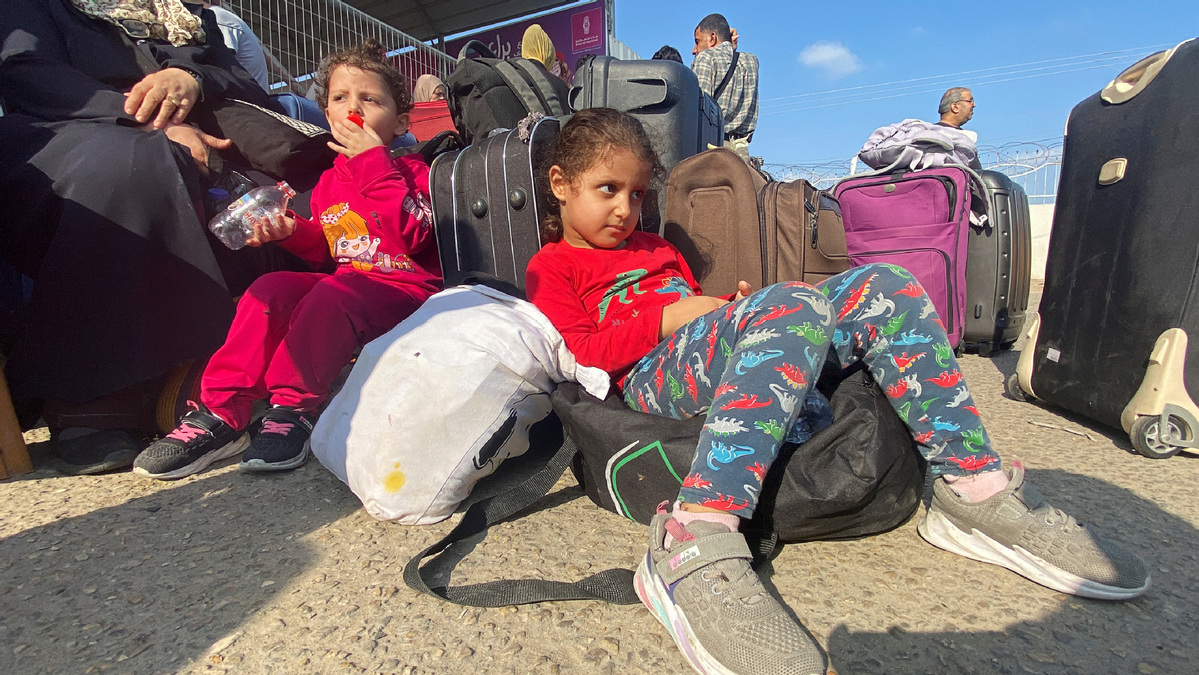
RAFAH, Egypt - Some foreign passport holders are crossing into Egypt on Wednesday from the Gaza Strip via the Rafah crossing, the only linking point between Egypt and the besieged enclave, local sources told Xinhua.
LA PAZ - Bolivia on Tuesday severed diplomatic ties with Israel, accusing it of committing crimes against humanity in the Gaza Strip.
"Bolivia decided to break diplomatic relations with the state of Israel in repudiation and condemnation of the aggressive and disproportionate Israeli military offensive taking place in the Gaza Strip," Deputy Foreign Affairs Minister Freddy Mamani said at a news conference.
Accusing Israel of "committing crimes against humanity in the Gaza Strip against the Palestinian people", Minister of the Presidency and Interim Chancellor Maria Nela Prada said, "Bolivia demands an end to the attacks in the Gaza Strip, which have so far caused thousands of civilian deaths and the forced displacement of Palestinians."
Bolivia calls for an end to the blockade that prevents the entry of food, water and other essentials for the survival of Palestinians, Mamani said.
Humanitarian aid will be sent from Bolivia to those affected in the Gaza Strip via the ministry of defense, Prada said.
Bolivian President Luis Arce met Monday with Palestinian ambassador to Bolivia Mahmoud Elalwani, "to whom he expressed his solidarity with the Palestinian people, especially girls and boys," she said.

JERUSALEM/GAZA - Israel intensified its ground offensive in the Gaza Strip on Tuesday, sending troops deep into the Palestinian territory and clashing with Hamas militants in fierce battles.
The Israel Defense Forces (IDF) said its soldiers had "fierce battles" with Hamas "deep in the Gaza Strip", adding that Israeli troops attacked hundreds of military targets of Hamas, including anti-tank missile and rocket launching posts below shafts and military compounds inside underground tunnels, and killed "numerous" Hamas militants.
Two Israeli soldiers were killed during a firefight in northern Gaza, the military said.
Hamas, the Islamic militant group that rules Gaza, said its fighters confronted the Israeli troops in several locations, including the Al-Tawam area and Al-Karama neighborhood in northern Gaza.
The Hamas-run Interior Ministry said some Israeli army vehicles advanced toward al-Rasheed Street, apparently trying to cut off Gaza City and the north from the south.
Heavy Israeli bombardment continued in Gaza on Tuesday, hitting Jabalia, a densely populated refugee camp in northern Gaza. The Gaza-based Health Ministry said in a statement that more than 50 people were killed, approximately 150 others injured, and "dozens" of others under the rubble.
The Arab League, Egypt, and Jordan have condemned the attacks on the refugee camp in separate statements.
Israeli fighter jets, acting on intelligence provided by the Shin Bet internal security agency, killed Ibrahim Biari, the commander of Hamas' Central Jabaliya Battalion. The Israeli military said Biari was one of the leaders responsible for the Hamas attacks on Oct 7, which killed at least 1,400 people in Israel.
IDF spokesman Richard Hecht confirmed the attack on Jabalia, adding that the death of civilians was a consequence of a "tragedy of war".
The death toll of Palestinians from Israeli attacks on the Gaza Strip has risen to 8,525, the Hamas-run Health Ministry said on Tuesday. Among the victims, 3,542 were children and 2,187 were women, ministry spokesperson Ashraf al-Qedra said in a press statement.
Meanwhile, rocket fired from Gaza continued on Tuesday, sending millions of Israelis to shelters. The Iron Dome system intercepted most of the projectiles, but several rockets hit towns in southern Israel, injuring four people, one seriously, Israel's Magen David Adom rescue service said.
In the north, Israel struck Hezbollah posts, targetting areas where mortar shells had been fired toward Israeli communities or militants trying to launch rockets.
Also on Tuesday, the Israeli military said its aerial defense systems intercepted a surface-to-surface missile from the Red Sea and a drone near the southern city of Eilat. No injuries or damage were reported.
The Houthis, who control Yemen's capital and much of northern Yemen, said in a statement on Tuesday afternoon that they targeted Eilat and an Israeli air base in the Negev desert with ballistic missiles and several drones.
They said Tuesday's attack was their third operation against Israel since the conflict between Israel and Hamas began, without elaborating on the previous two attacks.
SANTIAGO - Chile has decided to recall its ambassador to Israel for consultations over Israel's violation of international humanitarian law in the Gaza Strip, the country's foreign ministry said on Tuesday.
"Chile strongly condemns and observes with great concern that these military operations, which at this point in their development involve collective punishment of the Palestinian civilian population in Gaza, do not respect fundamental norms of International Law, as demonstrated by the more than eight thousand civilian victims, mostly women and children," the ministry said in a statement.
Chile's presidency called for "an immediate end to the hostilities" in order to "deploy a humanitarian support operation to help the hundreds of thousands of internally displaced people and civilian victims," it said.
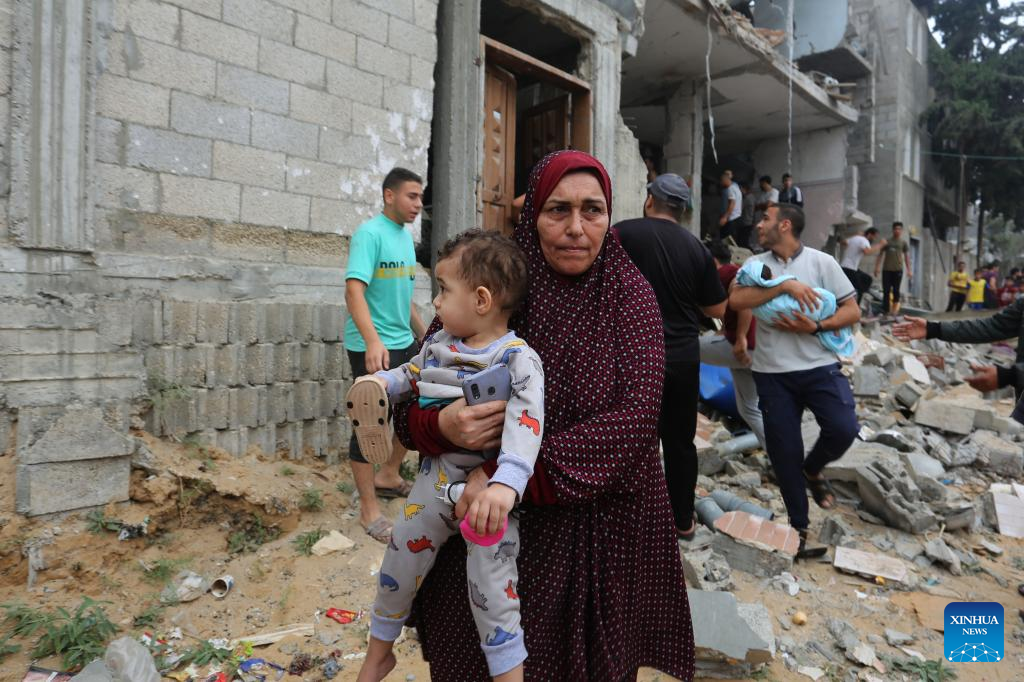
UNITED NATIONS - The killing of thousands of children in Gaza cannot be "collateral damage", said Philippe Lazzarini, the commissioner-general of the UN Agency for Palestine Refugees (UNRWA), on Monday.
Nearly 70 percent of those reported killed in Gaza are children and women. Save the Children, an international nongovernmental organization, reported that nearly 3,200 children have been killed in Gaza in just three weeks. This surpasses the number of children killed annually across the world's conflict zones since 2019, he said. "This cannot be 'collateral damage.'"
Churches, mosques, hospitals, and UNRWA facilities, including those sheltering displaced people, have not been spared. Too many people have been killed and injured while seeking safety in places protected by international humanitarian law, he told the Security Council.
The atrocities of Hamas do not absolve Israel from its obligations under international humanitarian law. Every war has rules, and this one is no exception, he said.
The current siege imposed on Gaza is collective punishment, said Lazzarini.
Two weeks of full siege followed by the trickle of aid last week mean that basic services are crumbling and that medicine, food and water, and fuel are running out. The streets of Gaza have started overflowing with sewage, which will cause a massive health hazard very soon, he said.
In the latest blow, the communications blackout over the weekend has aggravated the panic and distress of people, he said.
The blackout meant that people could not communicate with their loved ones inside Gaza to know who was dead and who was alive, that they no longer knew whether they would receive bread from UNRWA, that they felt abandoned and cut off from the rest of the world, he said.
The communications blackout has accelerated the breaking down of civil order. Panic pushed thousands of desperate people to head to the UNRWA warehouses and distribution centers. A further breakdown in civil order will make it extremely difficult, if not impossible, for UNRWA to continue operating. It will also make it impossible to bring in convoys, he warned. "I say this while being fully aware that UNRWA is the last remaining lifeline for the Palestinian people in Gaza."
The horrific attacks by Hamas in Israel on Oct 7 were shocking. The relentless bombardments by the Israeli Forces of the Gaza Strip are shocking. The level of destruction is unprecedented, the human tragedy is unbearable, said Lazzarini.
One million people, half the population of Gaza, were pushed from the north of the Gaza Strip toward the south in three weeks. The south, however, has not been spared from bombardment, with significant numbers of people killed, he said. "I have said many times, and I will say it again: no place is safe in Gaza."
What happened and continues to happen is forced displacement. Over 670,000 displaced people are now in overcrowded UNRWA schools and buildings. They live in appalling, unsanitary conditions, with limited food and water, sleeping on the floor without mattresses, or outside in the open, he said.
Lazzarini said there must be strict adherence to international humanitarian law. This means civilians and civilian infrastructure, including UN premises, schools, hospitals, places of worship, and shelters hosting civilians, must be protected all over the Gaza Strip and at all times. This is not an option, it is an obligation.
He called for a safe, unimpeded, substantial and continuous flow of humanitarian aid, including fuel, into Gaza and across the strip. For this to happen, there is a need for an immediate humanitarian cease-fire.
"An immediate humanitarian cease-fire has become a matter of life and death for millions. The present and future of Palestinians and Israelis depend on it. I urge all (UN) member states to change the trajectory of this crisis, and work toward a genuine political solution - before it's too late," said Lazzarini.

China's top envoy to the United Nations on Monday urged all parties of the Israeli-Palestinian conflict to cease the hostilities, lift Gaza's full siege, restore supplies, release detainees and promote diplomatic dialogue for a political resolution.
"The decades-long history of the Palestinian-Israeli issue has taught us that military means is not the solution," Zhang Jun, China's permanent representative to the United Nations, said at an emergency meeting of the Security Council on the humanitarian crisis in Gaza called by the United Arab Emirates and China on Monday.
"Absolute security cannot be achieved by imposing collective punishment on civilians, and violence for violence will only exacerbate hatred and confrontation," said Zhang.
"We call on the parties to the conflict to abandon their blind faith in the use of force and to commit themselves to breaking the cycle of violence and achieving common security," he said.
He called on the parties to the conflict to cease all hostilities, disengage immediately, put in place a humanitarian truce, and make every effort to prevent the situation from escalating further.
"China solemnly calls on Israel as the occupying power to fulfill its obligations under international humanitarian law, lift its full siege on Gaza, immediately rescind its emergency evacuation order and expeditiously restore the supply of basic necessities so as to prevent an even larger humanitarian disaster," Zhang said.
"China solemnly calls for greater diplomatic efforts to facilitate the release of hostages without delay and to work on this basis to open up space for dialogue, so as to return to the track of a political settlement," he said.
"China solemnly calls on a certain major country with special influence on the parties concerned to put aside its self-interests and geopolitical considerations and make every effort to stop the war and restore peace," he continued.
The UN General Assembly on Friday passed a resolution calling for an "immediate, durable and sustained humanitarian truce" in Gaza. The resolution was adopted with 120 votes in favor, 14 votes against, and 45 abstentions.
The resolution also calls for protection of civilians and civilian subjects, protection of humanitarian personnel and facilities, and "immediate and unconditional release" of all civilians being illegally held captive.
"This reflected the widespread call on the part of the international community," said Zhang.
"Regrettably and unacceptably, however, Israel, turning a deaf ear to the common concerns of the international community, has chosen to further escalate its military operations in Gaza and formally declared the launch of a ground assault," he said.
"There will be no firewall in Gaza," said Zhang. "It is a dangerous myth to think that a contained war is possible there. Allowing the fighting in Gaza to continue could very well turn it into a military catastrophe that will engulf the entire region.
"The situation in the West Bank and along the Lebanese-Israeli border has already sounded the alarm. We call on all parties who are concerned about the spillover of the conflict to devote their efforts towards promoting a cease-fire in Gaza," he said.
"As long as the war rages on, more violations of international humanitarian law are bound to happen. Without a comprehensive cease-fire, humanitarian assistance, no matter how much there is, will only be a drop in the ocean," said Zhang. "What they need is concrete actions to restore peace, uphold the rule of law, and save lives."
Israeli troops continued expanding operations in Gaza on Monday as the death toll of Palestinians on the Gaza Strip has risen to 8,306, including 3,457 children and 2,136 women, according to the Hamas-run Health Ministry.
Israel's attacks were in response to a major Hamas assault on Oct 7, resulting in the deaths of at least 1,400 people in Israel so far. The Israel Defense Forces reported that 239 hostages, primarily civilians, were taken during the Hamas attack.
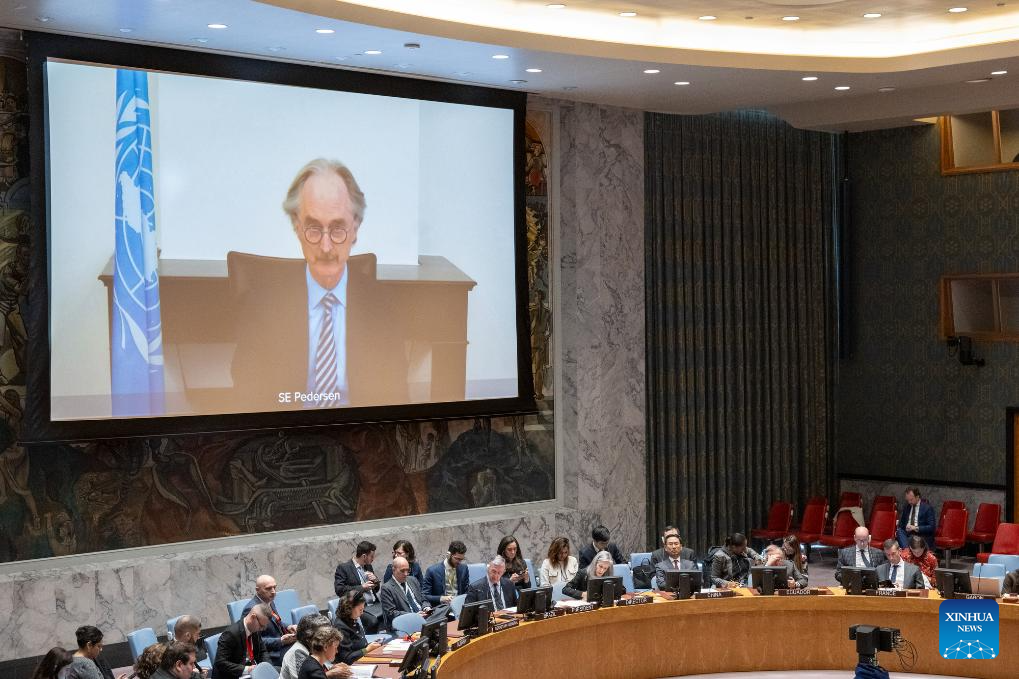
UNITED NATIONS - UN Special Envoy for Syria Geir Pedersen on Monday warned that spillover of the Israeli-Palestinian conflict into Syria has already begun.
Since March 2020, the Syrian conflict has been in a kind of strategic stalemate characterized by static front lines, persistent violence and sporadic escalation, with de facto authorities entrenching their control and five foreign armies present and active, he told the Security Council.
"However, I have long warned that this status quo leaves Syria at risk of drifting into deeper and prolonged fragmentation and that it involves escalation risks of the most frightening kind," he said. "My warnings have grown louder this year as we have seen growing instability and violence, exacerbated by the lack of a meaningful political process. Today, I am sounding an alarm that the situation is now at its most dangerous (point) for a long time."
Pedersen said he is sounding the alarm because, on top of the violence emanating from the Syrian conflict itself, the Syrian people now face a terrifying prospect of a potential wider escalation, given the alarming developments in Israel and the occupied Palestinian territory and the region.
"Spillover into Syria is not just a risk. It has already begun," he said.
Airstrikes, attributed to Israel, have hit Aleppo and Damascus airports several times in the past month. In addition, Israel says it has responded with artillery, mortar and airstrikes toward what they said were a number of launches from Syria toward Israel on the occupied Syrian Golan. The Syrian government says some of its soldiers were killed and injured in these strikes, as well as civilian workers in the strikes on the airports, said Pedersen.
Meanwhile, the United States says its forces have faced multiple attacks by groups that it claims are backed by Iran, including on Syrian territory. Last week, the United States carried out strikes on facilities in Syria that it claims are used by Iran's Islamic Revolutionary Guard Corps and groups it backs. Further exchanges were reported again on Monday, he noted.
"With the wider region at its most dangerous and tense (point) in a very long time, fuel is being added to a tinderbox that was already beginning to ignite. Even before the regional developments, Syria was seeing the worst surge in violence in more than three years," he said.
There has been a significant intensification of attacks on government-controlled areas in Syria. This includes a deadly attack on the graduation ceremony of a military academy in Homs, which remains unclaimed and which the government attributed to terrorist organizations, as well as further attacks in subsequent days. It also includes reports of rocket attacks throughout October from Security Council-listed terrorist organization Hayat Tahrir al-Sham. Hundreds were reportedly injured and many dozens killed, among them civilians, he said.
Pro-government bombardment in the northwest has escalated to levels echoing those at the height of the conflict before 2020, he added.
Following a terrorist attack on Turkish government facilities in Ankara, the northeast has seen one of the largest escalations in years, with reports of Turkish strikes, the destruction of civilian infrastructure and reports of casualties, including civilians, he said.
Meanwhile, the Islamic State terrorist group remains active, and has continued its attacks on forces, particularly in Deir-ez-Zor, Raqqa and the central desert region in Homs governorate, he said.
"Syria, the Syrian people and the wider region are in no position to endure new explosions of violent conflict in Syria, whether caused by internal or external dynamics. And we are seeing now the hard reality that, without real engagement and progress toward a political solution of the Syrian conflict, any stability is only wafer-thin, and when it breaks apart, it can unleash mass forces of violence and instability," warned Pedersen.
"There is a real and growing danger of this in Syria. The only antidote would be an immediate de-escalation to stem the tide of violence and refocus on a credible political process that charts a path forward in a framework that fully respects and restores Syria's sovereignty, unity, independence and territorial integrity, and that enables the Syrian people to realize their legitimate aspirations, in line with Security Council Resolution 2254," he said.
Pedersen had four immediate messages to the Security Council:
First, the need for urgent de-escalation within Syria. Efforts are urgently needed to reinstate calm, toward a nationwide cease-fire, alongside a cooperative approach to countering Security Council-listed terrorist groups.
Second, the need for all actors -- Syrian and non-Syrian -- to exercise maximum restraint. It is particularly indefensible that Syria seems to be treated as a free-for-all space, in which different actors can settle their scores with one another, with impunity. Decisions that are outside of Syrian hands cannot be allowed to drag Syria into another war.
Third, the need for all actors to operate in full compliance with international humanitarian law, including protecting civilians and civilian infrastructure, and strictly upholding the principles of distinction and proportionality.
Fourth, the need for all key international actors to keep channels open and cooperate, despite the rising tensions on multiple fronts.
"This is the only way to de-escalate the current violence and protect the possibility of a political process to implement Security Council Resolution 2254. Complacency cannot be the answer. If it is, then I fear the already-fraying status quo may fully collapse, bringing untold misery to Syrian civilians and radiating further instability across a region that is already at breaking point. We must de-escalate -- and de-escalate now, for the sake of Syria," said Pedersen.
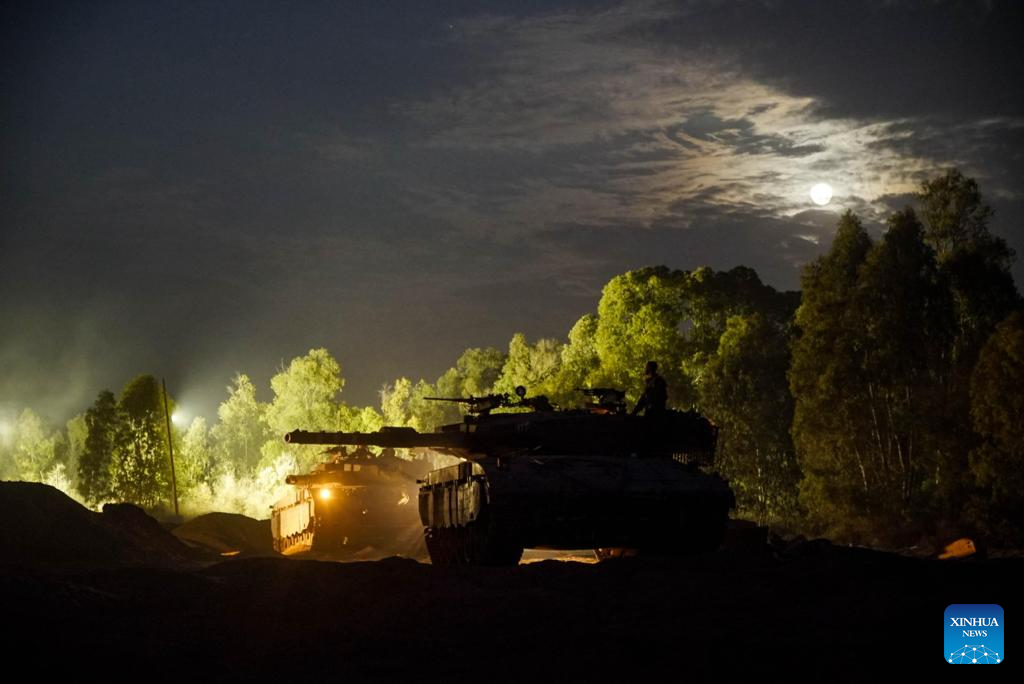
JERUSALEM/GAZA/CAIRO - Israeli troops continued ground operations in the Gaza Strip on Monday, as the death toll in the coastal enclave exceeds 8,300.
Also on Monday, Israel Defense Forces (IDF) announced in a statement that one Israeli soldier, who was abducted to the besieged Gaza Strip by Hamas on Oct 7, was released. The IDF said previously that a total of 239 people were taken hostage during the Hamas attack.
It said the soldier has undergone medical checks and is "doing well", and has met with her family, stressing that the IDF will continue to do everything to bring back other hostages.
Meanwhile, a Hamas official denied the Israeli army's claim, saying "it was aimed at causing confusion and perplexity and that no one believed the Israeli story".
Izzat al-Rishq, a member of Hamas' political bureau, said in a statement that "such an announcement aims to disrupt the video of the three female prisoners, which was a great shock to Israeli society", referring to a short video released by Hamas earlier in the day.
The video allegedly showed three female captives, one of whom fulminated about Israel's response to the hostage crisis. It is unclear when the video was shot.
Despite the international calls for a Gaza truce and the release of civilian detainees, Israeli Prime Minister Benjamin Netanyahu said on Monday evening that a cease-fire "will not happen".
Netanyahu made the remarks to the foreign media in Tel Aviv, emphasizing that "Israel did not start this war. Israel did not want this war. But Israel will win this war".
Other statements released by the IDF said during clashes with Hamas militants in Gaza, the IDF troops killed dozens of those who barricaded themselves in buildings and tunnels and attempted to attack the troops.
One statement noted that over the last few days, the IDF struck over 600 Hamas targets, including weapons depots, anti-tank missile launching positions, as well as hideouts and staging grounds used by Hamas.
The IDF also said it carried out strikes against Hezbollah military infrastructure in Lebanon, including military posts.
Israeli tanks rolled into the southern outskirts of Gaza City on Monday, clashing with Hamas fighters who tried to stop their advance, Palestinian security sources and eyewitnesses said.
The sources added that dozens of Israeli army vehicles crossed from the eastern parts of the Gaza Strip and reached the main Salah al-Din road, cutting off Gaza City from the central part of the territory.
Rocket sirens sounded in various locations in Israel on Monday, including surrounding areas of Gaza, northern towns close to the border with Lebanon, and the western Sea of Galilee, as well as in Jerusalem. Israeli authorities announced that approximately 8,000 rockets have been fired toward Israel since Oct 7.
The death toll of Palestinians from Israeli attacks on the Gaza Strip has risen to 8,382, according to the official Palestinian news agency of WAFA, while more than 1,400 people in Israel lost their lives, the vast majority in the Hamas attack on Oct 7, which triggered the latest conflict.
Since the conflict began, Gaza is believed to be on the brink of a humanitarian crisis, with very limited access to food and water, no fuel for electricity, and its health system being overwhelmed.
On Monday, a convoy of 60 trucks carrying humanitarian aid crossed the Egyptian side of the Rafah crossing before entering the Gaza Strip, according to an Egyptian military source.
Some 193 trucks carrying 3,100 tons of humanitarian aid have passed through the crossing on their way to the Gaza Strip since the delivery of aid began on Oct 21, said another Egyptian official.
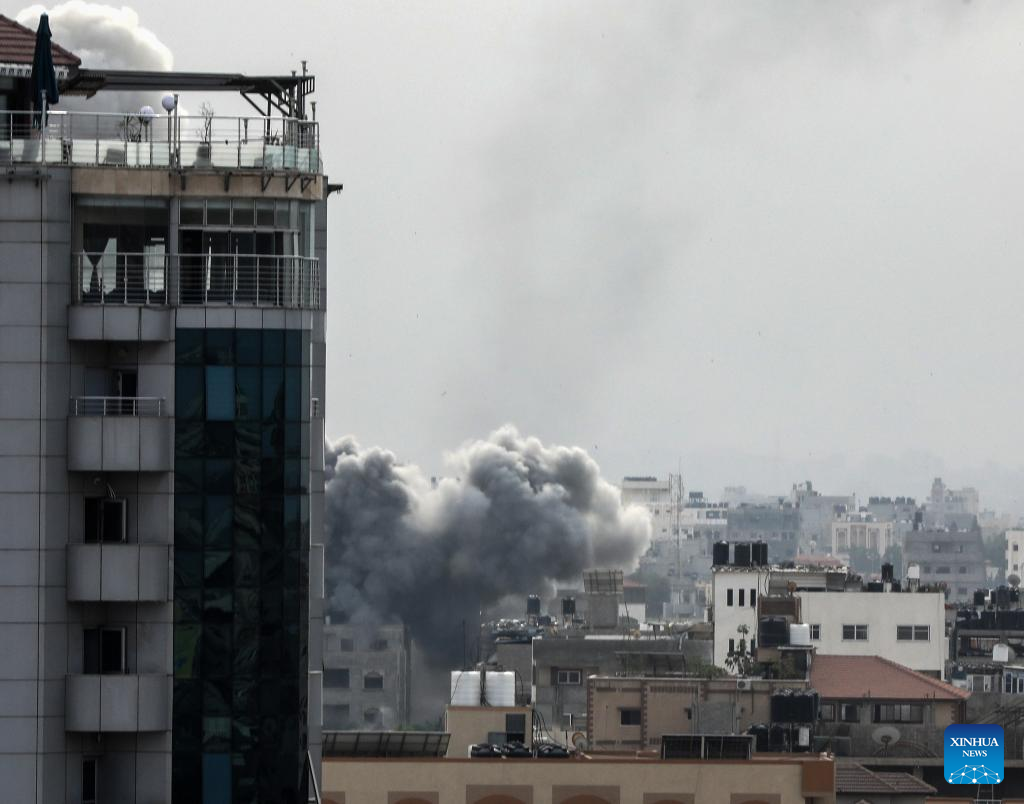
JERUSALEM - Israeli troops were continuing ground operations in the Gaza Strip, the Israel Defense Forces (IDF) said Monday morning.
During clashes with Hamas militants in the coastal enclave, IDF troops killed dozens of those who barricaded themselves in buildings and tunnels, and attempted to attack the troops, according to a statement released by the IDF.
In one incident, an IDF aircraft guided by ground troops struck a staging post inside a building belonging to Hamas, with over 20 operatives of the militant group inside it, said the statement.
The statement also noted that over the last few days, the IDF struck over 600 targets of Hamas, including weapons depots, dozens of anti-tank missile launching positions, as well as hideouts and staging grounds used by Hamas. Moreover, overnight IDF troops identified armed Hamas militants and an anti-tank missile launching post in the area of the Al-Azhar University and guided a fighter jet to strike them.
Israeli Prime Minister Benjamin Netanyahu said on Saturday that the country's war cabinet and political cabinet "unanimously decided to expand the ground operation" in the Gaza Strip.
The decision was made as regional countries warned Israel against further ground operations.
In a press conference joined by other senior officials in Tel Aviv, Netanyahu said Israel is now "heading into the second stage of the war", during which his country will try to achieve its target of destroying "Hamas's military and governing capabilities, and returning the hostages home".
Israel has launched massive airstrikes and ground operations against Gaza in retaliation for a surprise attack by Gaza-ruling Hamas militants on Israeli military targets and towns on Oct 7, which killed at least 1,400 people in Israel.
A total of 229 hostages were taken hostage during the Hamas attack, most of them civilians, according to the IDF.
The Palestinian death toll from Israeli strikes on the Gaza Strip rose to 8,070, the Hamas-run Health Ministry said on Sunday.
TEHRAN - Iranian Foreign Minister Hossein Amir-Abdollahian and his Saudi counterpart Faisal bin Farhan Al Saud on Sunday highlighted the necessity to take regional and international action to immediately stop Israel's attacks against civilians in Gaza.
In a phone call, the two sides discussed the latest developments in the Gaza Strip, calling on the international community to prepare the ground for the constant delivery of humanitarian aid to Gaza and prevent the forced displacement of its citizens, according to a statement released by the Iranian Foreign Ministry.
They stressed the need for holding continuous consultations between Tehran and Riyadh.
On the same day, Amir-Abdollahian also exchanged views on Gaza developments with his Qatari counterpart Sheikh Mohammed bin Abdulrahman Al Thani in a separate phone conversation, the ministry said in another statement.
The Iranian and Qatari foreign ministers emphasized that the Israeli "aggressions" against Gaza must stop immediately, calling for "constant and extensive" aid delivery to the enclave.
Hamas launched a surprise attack on Israel on Oct 7, firing thousands of rockets and infiltrating Israeli territory, to which Israel responded with massive airstrikes, ground operations, and punitive measures, including a siege on the Gaza Strip with supplies of water, electricity, fuel, and other necessities being cut off.
The Israel-Hamas conflict, as it entered the 23rd day, has killed more than 8,000 Palestinians in Gaza and at least 1,400 people in Israel, according to official figures from both sides.
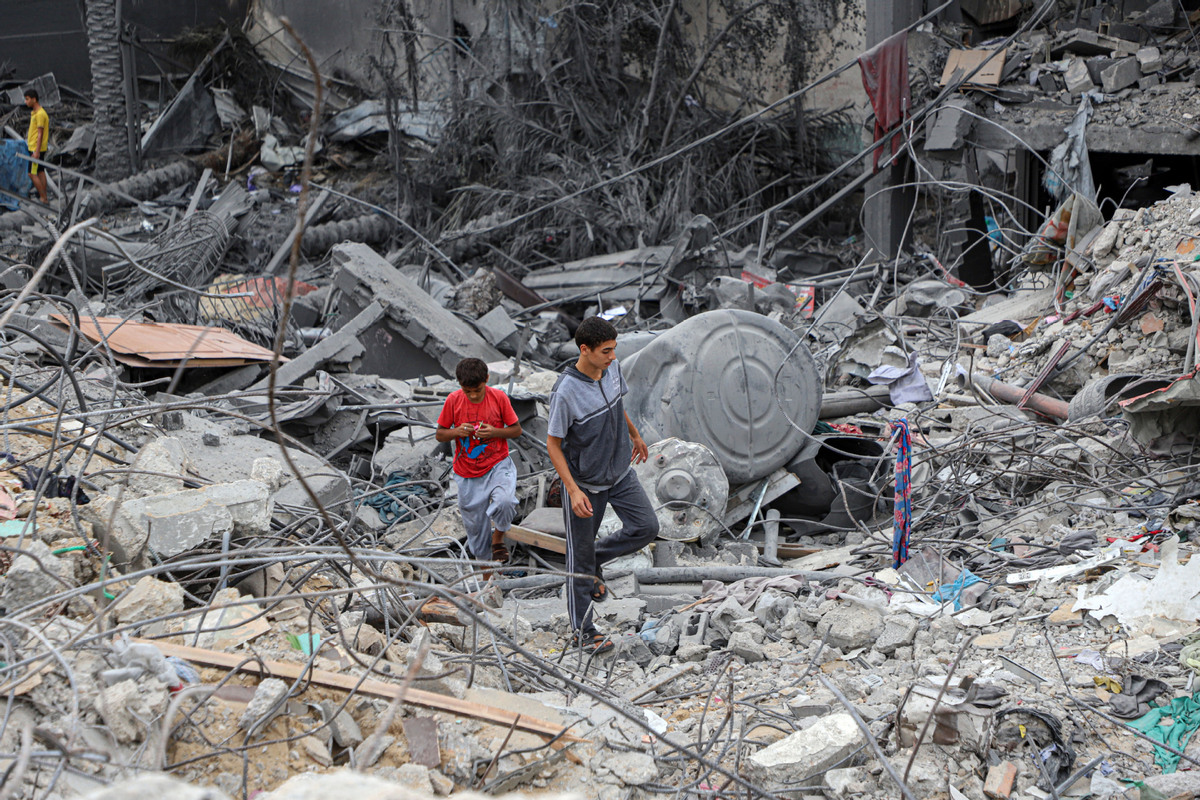
Southeast Asian regions urge for an immediate cease-fire between Israel and Palestine despite diverse views on root causes, as some members sharply criticize Israeli excessive attacks and the US blind support.
The Israel-Palestine conflict has exposed divergent viewpoints within the region, as individual countries take opposing sides on the issue, guided by their respective interests and affiliations, analysts said.
As members of the Association of Southeast Asian Nations (ASEAN), Southeast Asian leaders have signed a statement that condemned all attacks against civilians, called for humanitarian aid and urged for a peaceful resolution to the conflict with a view to realizing the two-state solution based on the pre-1967 borders.
But while they have found common ground in the pursuit of peace and protection of civilians, ASEAN member countries have contrasting views on the root of the conflict.
Herman Joseph Kraft, professor of political science at the University of the Philippines, said that while the intensifying Middle East crisis may not directly hurt ASEAN solidarity as a regional grouping, the issue has exposed contrasting views among individual member countries.
Muslim-majority countries like Brunei, Indonesia and Malaysia "might have popular opinion supportive of the Palestinians," Kraft told China Daily. But he said Hamas' actions and the Israeli responses have "once again raised concerns over a need to strengthen security against extremist activities in support of the plight of the Palestinians".
Malaysian Prime Minister Anwar Ibrahim has pledged "continued solidarity and unwavering support for Palestine" in an Oct 27 media interview. Indonesia said Israel's occupation of Palestinian territories is the "root of the conflict".
Indonesia has also co-sponsored a United Nations resolution calling for "an immediate, durable and sustained humanitarian truce leading to a cessation of hostilities" between Israeli forces and Hamas militants in Gaza. The General Assembly adopted the resolution on Oct 27.
The Philippines has abstained from voting for the non-binding UN resolution. Antonio Lagdameo, Philippine Permanent Representative to the UN, said Manila acknowledges the right of Israel to self-defense.
Shortly after Hamas' surprise attack against Israel, Singapore issued a statement that "strongly condemns the rocket and terror attacks from Gaza on Israel". Thailand has offered its "deepest condolences" to Israel owing to the "unfortunate loss of lives and injuries from this inhumane and indiscriminate act".
Vietnam said it is "deeply concerned" over the escalating violence between Hamas and Israel.
As the Middle East crisis intensifies, Israeli launch of ground operations in Gaza over the weekend may also further divide the regional bloc, according to Awang Azman Awang Pawi, associate professor in the Academy of Malay Studies at the University of Malaya in Kuala Lumpur.
"The conflict can lead to divisions among ASEAN members with some countries taking sides based on their geopolitical alliances and (national) interests," Awang Azman told China Daily.
Despite the wide geographical distance between the Middle East and Southeast Asia, the Israel-Palestine conflict has reverberated across ASEAN owing to the close historical, political and economic ties between the two regions. Brunei, Indonesia and Malaysia support Palestine and have no diplomatic ties with Israel.
The Philippines voted in favor of UN Resolution 181 in 1947, which partitioned Palestine into two states: one Arab and one Jewish. Israel is also home to thousands of Filipino and Thai migrants.
Vietnam has a free trade agreement with Israel, while Singapore has invested nearly S$3 billion in the Jewish state.
Bilveer Singh, associate professor of political science at the National University of Singapore, said while ASEAN countries like Indonesia and Malaysia are "largely sympathetic to the Palestinians", the regional bloc has "to play a balancing act" amid the geopolitical tension.
Singh said the West, especially the US "are condoning and assisting the Israeli aggression," adding that the Palestinians are defending their "legal, historical and legitimate homeland".
"Israel's future in ASEAN is over and the US and West (influence) will be greatly weakened in the region," Singh told China Daily.
Awang Azman of the University of Malaya said that since major global powers are involved in the Israel-Palestine conflict, these countries' "influence and interventions in the Middle East can indirectly affect Southeast Asia". He said external forces may challenge ASEAN's centrality.
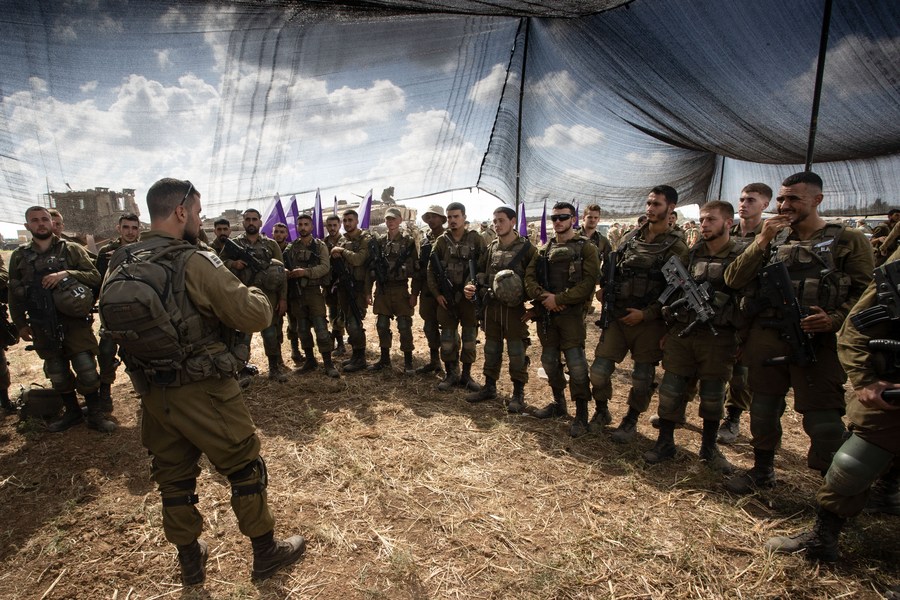
JERUSALEM/GAZA -- Israeli Prime Minister Benjamin Netanyahu said on Saturday that the country's war cabinet and political cabinet "unanimously decided to expand the ground operation" in the Gaza Strip. Meanwhile, regional countries warned Israel against further ground operations.
In a press conference joined by other senior officials in Tel Aviv, Netanyahu said Israel is now "heading into the second stage of the war," during which his country will try to achieve its target of "destruction of Hamas's military and governing capabilities, and returning the hostages home."
Netanyahu also warned that the war would be "long and hard" and demanded again that Palestinian civilians evacuate northern Gaza where Israel is focusing its attack.
Israeli Defense Forces (IDF) Chief of Staff Herzi Halevi also said in a video statement on Saturday that a ground operation was imminent, adding that the goals of the IDF "dictate a ground offensive."
Israeli forces have conducted limited ground operations in recent days in Gaza ahead of what is believed to be a massive ground invasion. Over 300,000 reservist troops were called up for duty, while many of them amassing along the border with Gaza.
According to statements released by the IDF on Saturday, the Israeli air force hit more than 150 underground tunnels and bunkers of Hamas, in addition to the pinpoint ground incursions.
On the same day, Al-Qassam Brigades, the armed wing of the Islamic Resistance Movement (Hamas), said in a televised speech that it is ready to hold talks with Israel on solving the hostage issue, but Israel did not show "real seriousness." Al-Qassam Brigades stressed the only condition for releasing the hostages was for Israel to free all Palestinian prisoners.
Netanyahu met with relatives of some of the hostages and the encounter was reported as tense, as the families called for the release of thousands of Palestinian prisoners held in Israeli jails in exchange for the hostages.
Following the meeting, family members held a rally in front of the Israeli military headquarters in Tel Aviv, expressing concerns about the potential risks to the hostages if a ground incursion into Gaza were to occur.
Israeli Defense Minister Yoav Gallant addressed these concerns during a press conference, stating that "the more military pressure we apply, the greater the chance of reaching a solution regarding the hostages."
Countries in the region warned Israel on Saturday against further ground operations in the coastal enclave. Saudi Arabia's Foreign Ministry said in a statement that it "condemns and denounces any ground operations carried out by Israel due to the threat they pose to the lives of Palestinian civilians".
Qatari Foreign Minister Mohammed bin Abdulrahman Al Thani said in a post on social media platform X that an "Israeli ground escalation will have dire results for civilians, and devastating humanitarian and economic dimensions."
Jordanian Foreign Minister Ayman Safadi and visiting Bahraini Foreign Minister Abdullatif bin Rashid Alzayani stressed in Jordan's capital Amman the importance of joint Arab action to halt the ongoing Israel-Hamas escalation.
Also in the day, Turkish President Recep Tayyip Erdogan accused the West of failing to stop the Israeli offensive and slammed Israel's attacks on Gaza at a pro-Palestinian rally. He said that "it's the West that is most responsible" for the killings in Gaza.
The Lebanese Ministry of Foreign Affairs warned in a statement that Israeli behavior "devoid of any controls or accountability" may ignite the Middle East, fuel hatred in the world, and threaten regional and international peace.
The Israel-Hamas conflict has entered its 22nd day, and the death toll of Palestinians from Israeli military strikes on the Gaza Strip has risen to 7,703, the Hamas-run Health Ministry said on Saturday.
Meanwhile, about 1,400 Israelis were killed, the majority of them in the Hamas offensive that occurred three weeks ago, while about 230 civilians, the majority of them civilians, are being held captive by Hamas.
